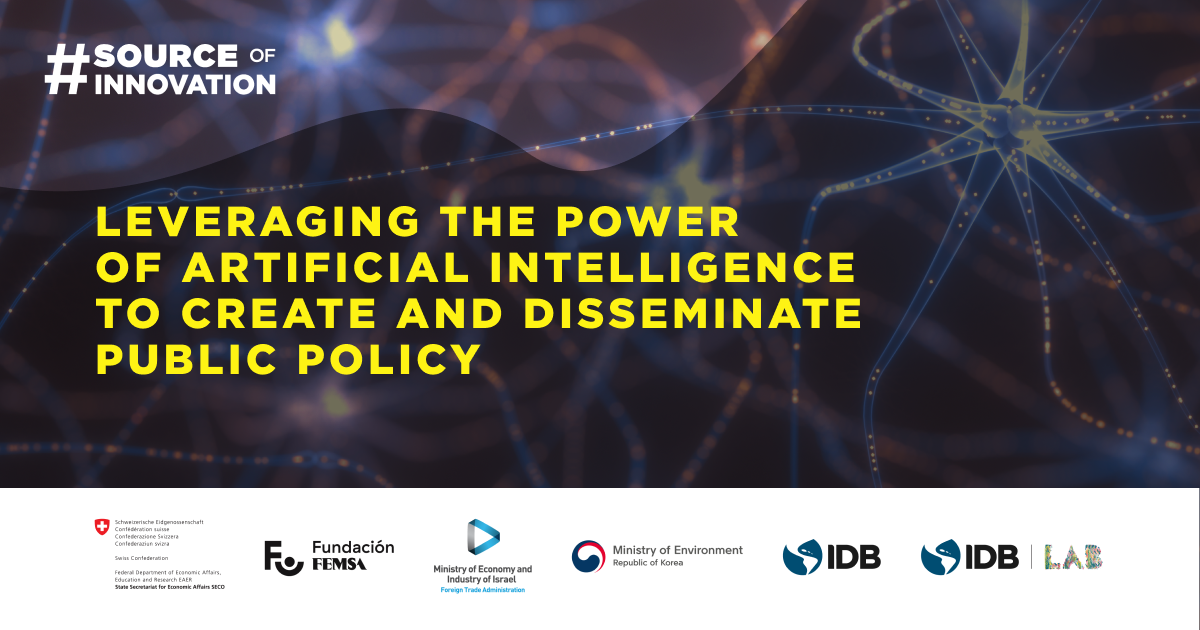The world of technology is advancing rapidly, and Artificial Intelligence (AI) and machine learning are at the forefront. The Inter-American Development Bank (IDB) strongly believes in the advantages of using cutting-edge technologies such as AI, machine learning, deep learning, and transformers to enhance efficiency and productivity, increase inclusivity, and reduce emissions in infrastructure. In Latin America and the Caribbean, these technologies enable countries to analyze data more effectively and automate manual processes, resulting in better decision-making and services.
The infrastructure sector already applies technologies that reduce water and electricity losses, automate pavement and signage analysis, diagnose road safety features, and automate satellite imagery inspection to estimate solar power generation, detect water and sanitation assets, and create inventories of unpaved roads.
AI can revolutionize the water sector by providing innovative solutions to complex challenges. It can be used to analyze data from multiple sources (sensors, satellites, and social media) to identify water quality issues and predict trends. Thus, water managers can respond to contamination events quickly and accurately. AI can optimize water resource management by predicting demand, identifying leakages, and optimizing treatment processes. It can predict flood and drought events based on weather, soil moisture, and water level data analysis and help managers take preventive measures. Finally, it can even identify wastage in homes and businesses and suggest ways for consumers to conserve water and reduce their bills.
One of the most exciting developments in this field is the rise of OpenAI’s language model: ChatGPT, a cutting-edge technology that can revolutionize the way we produce and manage knowledge, especially in public policy, from initial ideas to final briefs and project implementation. This language model relies on a massive dataset of millions of web pages to generate text that is almost indistinguishable from that written by a human.
With ChatGPT, knowledge producers and organizations looking to create high-quality content can produce policy briefs, reports, and other written materials in a fraction of the time it would take to do so manually. For example, in the case of renewable energy, ChatGPT can quickly generate a list of potential initiatives, as well as outline the pros and cons of each one. Knowledge organizations can quickly and efficiently explore complex issues, provide in-depth analysis, and evaluate different scenarios and ideas from other fields to provide valuable insights and guide decision-makers in the development of more effective policies.
Policy experts could also use ChatGPT to:
- Generate summaries of large amounts of data, making it easier to digest and understand the information.
- Create data visualizations and interactive reports, adding language descriptions and explanations of the data, trends, and patterns, making it easier for stakeholders to understand the information presented.
- Simulate scenarios and assess the impact of different policy options, leading to the creation of better-informed and more effective public policies.
- Produce insightful reports with in-depth analysis of the impact of policy initiatives on the defined field.
- Quickly analyze large datasets and produce concise and actionable insights that can guide decision-makers.
- Understand the needs and perspectives of stakeholders, and provide recommendations and insights based on this information.
- Streamline the policy development process.
About Source of Innovation
Source of Innovation is an alliance of the IDB Group with external partners to promote the development and adoption of innovative solutions in the water, sanitation and solid waste sector to achieve smart, inclusive and sustainable services, with a focus on service providers in Latin America and the Caribbean.
Source of Innovation is funded by the Government of Switzerland through its State Secretariat for Economic Affairs (SECO), by the FEMSA Foundation, by the Republic of Korea through its Ministry of Environment and by the Government of Israel. The partnership is also complemented by direct contributions from IDB Lab and the Water and Sanitation Division, and coordinates directly with the Aquafund, a fund created with IDB capital and to which a wide range of public and private sector partners contribute.
Guest authors
Sonia Jalfin is the Director of Sociopúblico, a strategic partner of the IDB for the execution of the webinar Artificial Intelligence (AI) to create and disseminate public policies, assisted in the preparation of this article.
Alexander Riobó is a Senior Infrastructure Specialist at the Inter-American Development Bank (IDB), with over 25 years of experience in the ICT industry, both in the public and private sectors, with an emphasis on public policy, regulation and infrastructure deployment. At the IDB, he promotes the use of exponential technologies and innovation in investment and technical assistance operations for Latin America and Caribbean.
The IDB does not have any type of contractual agreement with OpenAI/ChatGPT. Therefore we are subject to the standard ChatGPT’s Terms of Use (Terms of Use (openai.com) and Privacy Policy (Privacy Policy (openai.com). In this policy, you can find explanations on the information they collect it and how they use it.


Leave a Reply